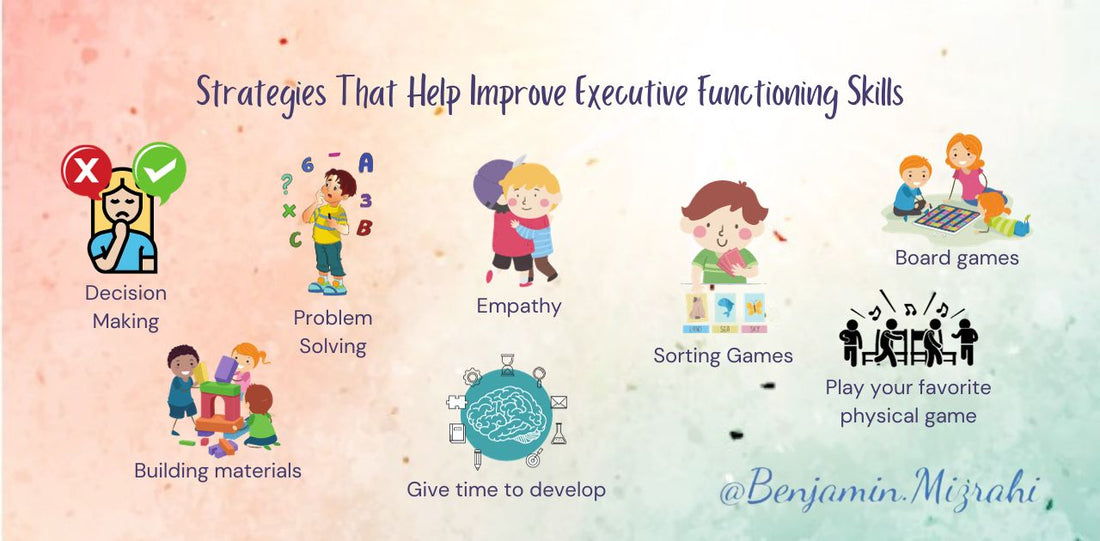
Strategies That Help Improve Executive Functioning Skills
Share
When we practice using our executive functions, it helps them to develop and get stronger over time. Executive functioning is essential for social and emotional intelligence.
As a parent, you can encourage your child to use these skills every day in order to promote strong executive functioning skills.
1. Decision Making
Give your child choices throughout the day. For little ones, this can be as simple as “Do you want to wear your pink shirt or your yellow shirt today?”
Older children should have the chance to make more complex decisions. As parents, it can be instinctual to make the “right” choice for our kids, because we don’t want them to make mistakes, but this is a learning experience for children and necessary for them to have strong decision-making skills down the road.
The natural consequences of your choices can be the best learning experience.
2. Practice Problem Solving
If this is an area your child struggles with, try the problem-solving wheel to help teach effective problem-solving skills. Give them hypothetical scenarios and ask them to choose the best option(s) for solving the problem.
Practicing frequently will help them to be able to apply these skills in real-life situations. You can even act out different scenarios and use pretend-play to practice social skills and problem-solving at the same time.
3. Play Physical Activities That Require Attention
Kids need to pay attention to instructions and use their impulse control to play certain games. These games are also great ways to provide kids with proprioceptive input and is great for motor planning.
- Freeze dance
- Musical chairs
- Simon Says
- Duck Duck Goose
- Mother May I?
- Red Light, Green Light
4. Play Sorting Games
Getting children to sort objects by changing rules, such as first sorting by color, then mixing them back up and asking them to re-sort by shape helps improve cognitive flexibility.
Cognitive flexibility is the ability to adjust your thinking from an old situation to a new situation.
5. Play with Building Materials
Children learn best through play and through doing.
Give your child the opportunity to play with building toys, including blocks, mag snaps, train tracks, and racetracks, Legos, marble runs, etc.
It might seem like they’re just playing, but it takes strategic planning to build things with these toys. Planning, organization, and decision making goes into every creation.
If your child is building a train track, they’ll need a strategy to make the tracks connect at the end.
Likewise, if they’re building a tower from blocks, they’ll learn that you need bigger blocks at the base of the tower, or else it will fall over.
This building can evolve over time. As your child gets older, they can focus on building more complex Lego sets, or model airplanes, robots, etc.
These tasks require working memory, the ability to follow multi-step directions, focus, and concentration.
6. Play Board Games That Require Strategy
Strategic board games give your child a chance to practice planning and keeping it in mind for several moves. They must also adjust their strategy in response to the other players’ moves.
Through strategizing, a child’s inhibitory control, flexibility, and working memory need to work together, practicing many executive functions together.
7. Improve Empathy
It’s a myth that children with autism lack empathy.
They are very empathetic; the problem is that they have trouble reading how other people feel. They don’t pick up on body language and slight changes in tone of voice or facial expression as easily as others.
You can help improve your child’s ability at recognizing others’ feelings by drawing their attention to them regularly.
For example, when you’re watching their favorite TV show together ask your child how they think the character feels.
Over time this will help your child form connections between actions and feelings and help grow their understanding and they will become more empathetic.
This will also help your child to better identify their own big emotions and improve their perspective-taking abilities.
8. Give Executive Functioning Time to Develop
Finally, you just must give your little ones some time. As I mentioned earlier, the part of the brain responsible for executive functions doesn’t completely mature until the mid-twenties.
A child with ADHD usually is delayed by about 3 years in their level of executive functioning. As a parent just keep facilitating opportunities to learn, being patient and nurturing during meltdowns, setting boundaries when you need to, and playing lots of games together.
Coach Benjamin Mizrahi. Educator. Learning Specialist. Family Coach. Father. Husband.
More articles on Mr Mizrahi's Blog - Benjamin Mizrahi
